
May 5 and 7: Eduardo Gudynas in UNC Chapel Hill!


Working Films, UNC Geography, UNC Communication Studies, the Institute for the Environment, and the Duke Law and Policy Clinic brought filmmaker Leah Mahan and NC environmental justice activists Omega and Brenda Wilson to join us in the screening of Come Hell or High Water at UNC. This film is having an amazing tour–check out Leah Mahan’s post on NC Environmental Justice Tour– From Witness to Action. The NC EJ Tour will be featured at the “Using Documentary Film and Multimedia Art to Strengthen Efforts for Environmental Justice” at the National Environmental Justice Conference. Check it out: http://thenejc.org/ #nejc2015 #EJ
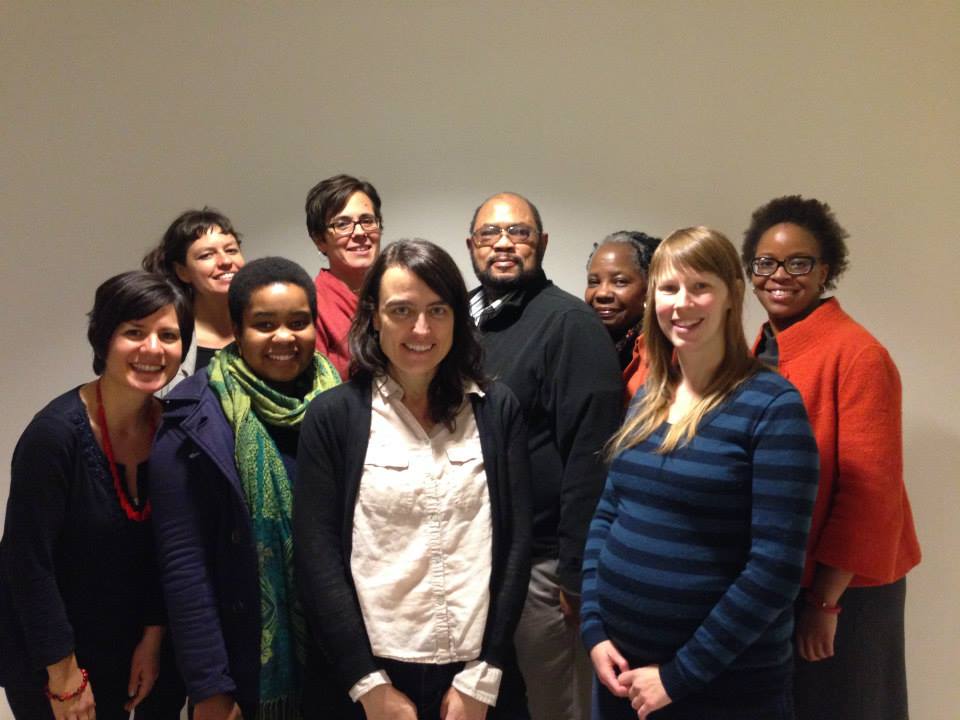
The UNC Chapel Hill Come Hell or High Water team!
Activities: Fall 2014-Spring 2015
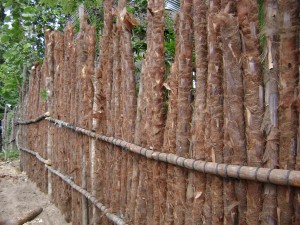
December 1-2: The group hosts two events with Sharlene Mollett, Centre for Critical Development Studies|Department of Human Geography at UTSC, on The Banality of Land Grabs in Latin America.
Sharlene Mollett has worked extensively among Afro-Latin American communities in Honduras, Nicaragua and Panama, exploring questions of race, gender and land/territory. Christian Lentz (Geography) and Chris Courtheyn (Geography) will offer short commentaries after the talk. Time and place: Monday, December 1, 2014, 3:15p.m. – 5:00p.m.4th Floor FedEx Global Education Center,301 Pittsboro Street, Chapel Hill, NC. We will also hold a workshop on race, racialization, and environment in Latin America. These workshops encourage interdisciplinary conversations. Time and place: Tuesday, December 2, 2014, 1pm-3pm. Saunders Conference Room, 321.
2008-2010 Global Education Center (FedEx Building).
Sandra Lopez is a visual artist and sculptress from Bogota. She currently resides in Puebla, Mexico, where she is doing a graduate program in art and aesthetics. Her work explores
the role of technical images in framing humans’ understanding of nature, and the ecological potential of visual arts through relational approaches.

February 19, 3-5pm, Hitchcock Room – Stone Center
Racialized Spaces and Proper Places: Frantz Fanon, Decolonization, and the Rise of New Territorialities
Alvaro Reyes, Department of Geography, Institute of African American Research faculty fellow

Friday, March 27, 2:30pm, FedEx Building, Room 1005.
Cartographies of Extractivism in Latin America, a workshop with Fernando Garcia, FLACSO-Ecuador. More information coming soon.
March 26-28: Race and Rurality in the Global Economy. Duke University, West Duke Building, Room 101.
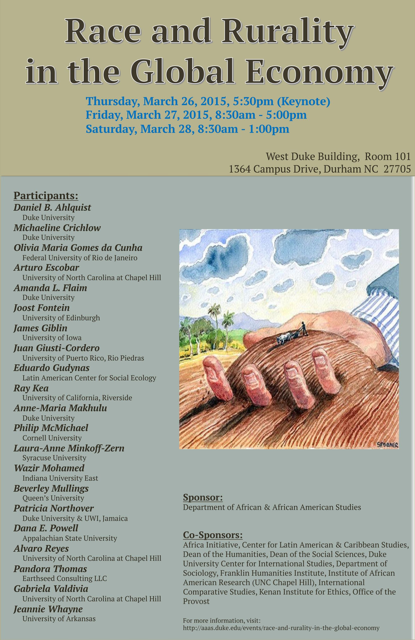
Our last event of the semester: Two talks by Eduardo Gudynas!

Activities: Fall 2013-Spring 2014
Friday September 20: Reading group on political economy, development, and regional geographic imaginaries: Gonzales Casanova, Coronil, and Price.
Friday November 15: Reina Elena Rodriguez, visiting scholar from the University of Zaragoza, will present her dissertation project on ecoaldeas in Colombia. Readings: Introduction to the book by Jacqui Alexander and Chandra Mohanty, Feminist Genealogies, Colonial Legacies, and Democratic Futures (1997)
Tuesday December 10: Conversation on the current moment of Zapatismo, led by Alvaro Reyes. Suggested readings: Raul Zibechi, El Arte de Construir Un Nuevo Mundo (http://www.cipamericas.org/es/archives/10446); Alvaro Reyes and Mara Kaufman “Zapatista Autonomy and The New Practices of Decolonization”; and Pablo Gonzalez Casanova,”Organizar una inmensa Red de colectivos en Defensa del territorio” (http://www.rebelion.org/noticia.php?id=161940)
Thursday Feb 6 and Friday February 7: Environmental justice and race scholar Laura Pulido will speak about engaged scholarship in geography and her research on landscapes of environmental racism.
Friday, April 11th: Roundtable on pedagogies, methodologies and praxis. We will initiate out discussion with three informal presentations by PhD students, who will share experiences and emerging projects in/with movements and organizations in Colombia and Brazil. The conversation will be enriched by the discussion of the text “Pedagogical Notes from the Decolonial Cracks” by Catherine Walsh.
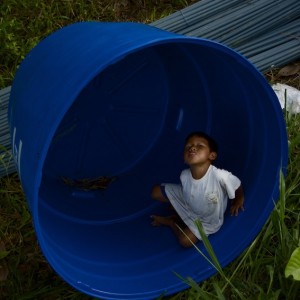
Tuesday May 27-30: Workshop with Ecuadorian sociologist Kati Alvarez, on the current political context of the Yasuni National Park in Ecuador. Readings TBA.
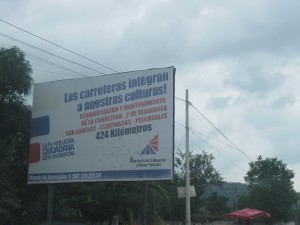 February 2014 was election time in Ecuador. Months earlier, the roads of Esmeraldas illustrated the upcoming election wars vividly: large signs announcing the arrival of the Citizen’s Revolution peppered major highways and city streets. Sewage, potable water, garbage collection, highways, schools, clinics: everything public became the terrain of political reform. Except the refinery. Overwhelmed by the signs, I could not stop photographing them–seeking to capture a hidden meaning beyond aggressive visual colonization. By March 2014, the vivid signs of regional and national campaigns were fading, bleached by the sun and overtaken by the local vegetation. A poignant (and fleeting) reminder of the ebbs and flows of political life. The Revolution didn’t just arrive–it already moved on. To Muisne, I think. The political battle continues there.
February 2014 was election time in Ecuador. Months earlier, the roads of Esmeraldas illustrated the upcoming election wars vividly: large signs announcing the arrival of the Citizen’s Revolution peppered major highways and city streets. Sewage, potable water, garbage collection, highways, schools, clinics: everything public became the terrain of political reform. Except the refinery. Overwhelmed by the signs, I could not stop photographing them–seeking to capture a hidden meaning beyond aggressive visual colonization. By March 2014, the vivid signs of regional and national campaigns were fading, bleached by the sun and overtaken by the local vegetation. A poignant (and fleeting) reminder of the ebbs and flows of political life. The Revolution didn’t just arrive–it already moved on. To Muisne, I think. The political battle continues there.